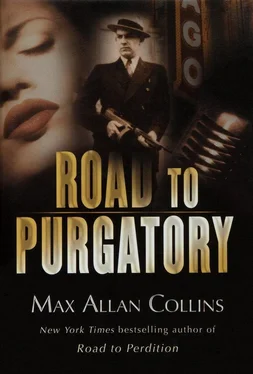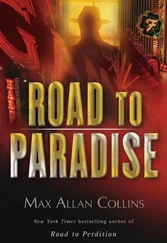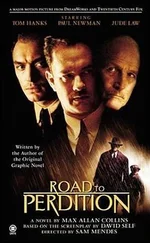She knew her husband, Mike, adored her; he placed her on a pedestal, though he was not shy about removing her from that perch, behind closed doors. A deep passion ran beneath the surface of this stoic man.
The former Annie O’Hanlon had known her husband for several years before they married. He had come to the Tri-Cities from New York, where his late father had been a railroad man; he’d heard that John Deere was hiring, and he landed a job as a shop sweeper. She’d met him through church activities at Sacred Heart, and for a time Mike had courted her best friend, Katie O’Meara.
Before long Annie and Mike had become a couple — Katie understood, she’d sensed the attraction between them — and they were talking of marriage when he got swept away into the war by the wave of patriotism encompassing the country. In fact, they’d been together, on the porch of her parents’ shanty, when the band had come marching by.
Literally.
The band was made up of college boys — twenty-one members of the Augustana marching band, and they’d enlisted as a unit in the 6th Illinois Regiment. They played a final concert, then paraded through town performing martial marches, from Rock Island to the train station, high-stepping right through Greenbush.
Mike enlisted the next day.
He had returned a hero with a glittering array of medals and a somber, more adult presence that both thrilled and intimidated Annie; he’d been a boy when he left, but things overseas had turned him into a man — things he made clear he would never discuss with her...
Shortly after Mike’s return, Mr. Looney had invited him up to his house on the hill, in the Longview Loop area — Rock Island’s Knob Hill, rife with doctors, lawyers, and old money. Mr. Looney lived on Twentieth Street in a brooding stone mansion in Highland Park, a far cry from Greenbush.
Annie did not know what Mr. Looney had said to Michael, other than a job had been offered. At first Michael called it a chauffeur position, later referring to it as a bodyguard; occasionally, in passing, he called himself Mr. Looney’s “lieutenant,” as if he were still a soldier.
Shortly after, Annie and Mike had married at Sacred Heart. Over the next several years, her husband’s responsibilities and his position grew in the Looney organization. They were invited to events at the Looney home (Mrs. Looney had died in the flu epidemic in 1914, and he lived alone with his son, Connor; two daughters were away at convent school).
And before long the money grew, as well — first the O’Sullivans had a car; then this lovely home of theirs. And along the way, they had their son, Michael, Jr.
Of course there were those who shunned the O’Sullivans for their affiliation with John Looney. Briefly the family attended St. Joseph’s, near the courthouse, but turned-up noses and whispered remarks among these good Christians put them off, and they returned to the simple church where they had ties.
Many in the Tri-Cities, and not just the Irish, considered the lanky, mustached, handsome John Looney to be a living folk hero, an Irish American rebel and entrepreneur, battling the powers that be. A self-schooled lawyer, Mr. Looney had run for the state legislature as a Democrat but was defeated through trickery by corrupt opponents; he had looked around at the way his people were treated in the Tri-Cities, it was said, and swore he’d provide his own government outside the system for these disenfranchised souls. He would see to it that “Micks” like Annie’s husband got jobs, if not in his own enterprises, then at the area factories, where he had influence.
Some had no real opinion about John Looney — he was just a colorful character who dressed in black like a riverboat gambler and had a flair for theatrics (performing as Irish Catholic martyr Robert Emmet in a one-man play). And of course, he was the man who helped the good citizens of the Tri-Cities skirt a bad law, the Eighteenth Amendment, seeing to it a fellow could have a beer... which many decent people considered a public service.
But still others saw Looney as, simply, a gangster.
Before they’d moved to this big house, Annie had once risked speaking to Michael about his working for Mr. Looney. She did not refer directly to the bootlegging, brothels, and gambling that were as much a part of John Looney’s empire as his newspaper, the Rock Island News . Nor did she speak of the pistol (brought home with him from the Great War) that Mike carried beneath his shoulder.
All she’d said, serving him coffee in the kitchen after supper, was, “You’re respected, Mike. You did your people right proud, over there. You could work for anybody.”
“I work for Mr. Looney,” he’d said. He lifted the filled coffee cup and said, “Thank you, dear.”
She sat. “Some say Mr. Looney makes his money in sinful ways.”
Mike had given her a hard look — almost cold. Certainly his words chilled her: “We don’t question how Mr. Looney makes his money. It’s not our place.”
On very rare occasions, when she had dared refer to this subject, Michael would speak almost exactly those same words; more often, he would silence her with a look.
And now in this grand house, with a wonderful son upstairs and another baby in the oven, Annie considered herself complied in whatever her husband and their patriarch did. What was the word, in the newspapers and magazines? She was an accomplice. She prayed for forgiveness, but she never spoke of her conflicted feelings to any priest — how do you confess to things you don’t know about?
And don’t want to know about?
Yet, the notion that her reserved husband was a “gangster” seemed an absurdity. Surely the whispered stories, the awful rumors, which she heard only the edges of, were gross exaggerations if not outright falsehoods.
This was a man who did not swear. Who did not smoke. Who did not drink (in a rare candid moment, he had admitted to her... when she wondered why they couldn’t have a simple glass of wine now and again... that his father had been a good man who showed a bad side when he drank, and Mike’s mother had suffered because of it).
And Annie had a deep and abiding faith in his faithfulness, where their marital bed was concerned, despite the loose women in the world of John Looney.
The smell of corned beef and cabbage emanated from the kitchen — her recipe, but not her doing. Mike had hired help for them, a Greenbush girl. Mary Jane Murphy, a sweet, crude slip of eighteen, cooked indifferently and cleaned lackadasically, but was gentle, even loving with the child.
And in her condition, Annie could not even bend over and pick the boy up.
The girl was skinny, almost scrawny, and looked like a child playacting in maid’s cap and costume. Mike quietly suggested Annie be tougher on the lass, but Annie could not bring herself to do so: she had been a maid herself, for several of the wealthy families, the Baileys with their lumber, the Greggs with their factories.
She had suffered cruelty at the hands of these “upper class” people, overhearing vile remarks that she recalled to this day... as when one of Rock Island’s wealthiest socialites cattily commented to another that Mrs. Bailey “could surely do better than a little Shanty Irish wench” like Annie.
The socialite said she herself preferred colored help, acknowledging that their service cost more than Irish girls.
No, Annie would not be a strict mistress where Mary Jane Murphy was concerned... at least as long as the wench stayed faithful to Annie’s recipes...
Mrs. Michael O’Sullivan did particularly love to cook, but she also took pride in her housework; still, like many women, the enforced relaxation of pregnancy provided a blissful vacation. Mike was insistent that she take it easy — she’d lost a daughter, by miscarriage, last year — and assured her that this time, she’d deliver “right and proper,” having been conveyed to the hospital “in good time.”
Читать дальше












